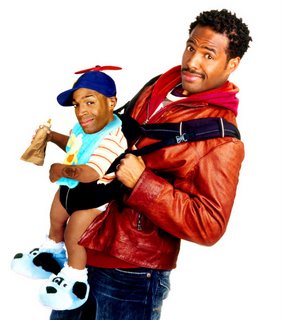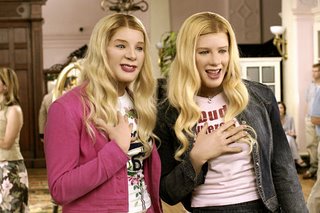 [So it's been a few weeks now since I went completely culture-snob, but it's time I got the following off my chest:]
[So it's been a few weeks now since I went completely culture-snob, but it's time I got the following off my chest:]As a society, as a people, as a country at war with those who would seek to destroy our way of life, we have been fighting on the wrong front(s). Iraq and Afghanistan and (soon-ish enough) Iran are one thing, but Little Man is another. In fact, it would be a fair assessment to state that the new Wayans film represents many of the reasons crazy people want to fly planes into our skyscrapers. I don't think I'm engaged in hyperbole here. Really. Let me explain...
A few months back, I wrote about the furor surrounding the first trailer for United 93. This was a moment in American film that polarized our moviegoing public like nothing that had come before. Sure, there have been many and various shocks to the system over the last hundred-odd years of American film. Many of us know all the landmark moments by heart, but when was the last time you were in a theater to witness people screaming, crying, and/or walking out based on a trailer? It's fair to say that Paul Greengrass' film was a major turning point in the way America deals with the defining moment of this young century, and not only because it was the first film (almost five years on) to show us what it meant to have been on one of 9/11's doomed planes. U93 was gripping and terrifying and challenging and confusing and everything that one could hope to experience in a major motion picture. I use the term "experience" here with the full weight of its definition, which is to say that anyone who walked into the theater faced the unique and horrible prospect of willingly reliving in vivid detail the events of that thunderbolt morning. If filmic entertainments are meant to be candysnacks for our idle brains, U93 was a Twinkie with broken glass in the creamy center. But I digress.
United 93 screened in most houses across the country sans trailers, out of respect to the film's gravity and the memories of those lost on 9/11. One of the consequences, however, of trying to sell such a weighty film, is that its trailer must run alongside those hawking more trivial entertainments. And thus the towering scale of my anger: before sitting through a mediocre crime flick, I saw the trailer for U93 followed by one for Little Man.
That just ain't right, and I believe I owe a brief aside to establish context:
My first job was in a movie theater, and I worked my way up from the popcorn hustle to projection. It was a great gig upstairs in the booth, mostly for the fact that nobody ever personally gave the projectionist a hassle. If a flick was flickering out-of-frame, we found out and corrected the problem. Ditto any sound troubles, any houselight problems, et cetera. But the head projectionist, he who worked Thursday nights and reeled together the Friday platters from the shipping cans, was in charge of assembling the trailers that would screen before any given film in the multiplex. The guidelines were and are relatively lax and commonsense: don't put a trailer for Pulp Fiction on The Lion King, don't put rom-com trailers before a horror flick--basically, just don't confuse the demographic coming to see Film/Genre A with trailers for Films/Genres B,C,D, and so forth.
So how does one build awareness for a Genuine Moment In Film History like U93 without necessarily pairing its trailer with some less-worthy material? It's a challenge, to say the very least. I can almost understand the clusterfuck of confusion that led to U93 being followed by Little Man. Almost. But you can always put U93 last-in-line, and make sure that trailers and features bear some of U93's weight. Somebody upstairs (in the booth, not the heavens) must have been asleep at the wheel to let a spot for Little Man follow the most contentious trailer in recent memory. My surprise at the misstep might have led to my writing off what many other filmgoers deemed a totally decent effort (Lucky Number Slevin), as the bad taste in my mouth lasted well past that film's closing credits. Little Man has since haunted my awareness in a way that few such lamentable attempts at filmmaking have ever bothered me before.
Hence this preamble to the following diatribe:
Little Man is the latest effort in CGI minstrelsy from the Wayans brothers, who apparently are burdened by nothing resembling guilt, shame, or any emotion that might weigh on a human conscience. Their most recent effort was White Chicks, which may have set the lowest possible bar for suspension of disbelief in contemporary film. In that movie Shawn and Marlon (Wayanses, both) were somehow placed undercover (or was it witness protection?) as--you guessed it--white chicks, in the least convincing latex makeup jobs ever witnessed on celluloid.
 But oh! how the people laughed at the silly black men in whiteface singing along to really-white emopop! And oh how funny it was to see the big black man fall for the black-man-in-anglobitch-drag-biting-toenails-at-the-dinner-table! What times those were, y'know, in like 2004, before the Civil War and Reconstruction and MLK, Jr. and everything that should have made such hideous displays cause for riots in the fucking streets!
But oh! how the people laughed at the silly black men in whiteface singing along to really-white emopop! And oh how funny it was to see the big black man fall for the black-man-in-anglobitch-drag-biting-toenails-at-the-dinner-table! What times those were, y'know, in like 2004, before the Civil War and Reconstruction and MLK, Jr. and everything that should have made such hideous displays cause for riots in the fucking streets!So now we have Little Man, in which Marlon W. plays the world's smallest cat-burglar, forced to hide a diamond the size of his head in the handbag of an upper-middle-class black woman. She's got a clueless husband (Shawn W.) who encourages her to accept the "baby" placed on their doorstep by Marlon's accomplice, the ever-more-disappointing Tracy Morgan. The "baby," of course, is Marlon-the-cat-burglar with a shave and a bonnet and a rattle. Apparently the short bus stopped at Shawn's house before Tracy came by with his bundle of joy, because the lucky young couple have no idea that the "baby" is actually a "grown" man, a midget diamond thief who only wants to get back his "booty."
(Please ignore my cheap and loaded fingerquotes.)
So we're supposed to accept that all the many HILARIOUS! situations that ensue tip neither Shawn nor Wifey to the fact that "baby" is "Marlon-the-thief." Okay. Alright. So even when "baby" is shaving with an electric at the bathroom mirror, smoking a stogie (that never stinks up the rest of the house?), offering his googly-eyed milking-face to the nearest set of tits (cue Benny Hill boob-music), and otherwise convincingly playing an infant WITH TATTOOS!!!, we're to assume that the audience are the only ones privileged with glimpses behind the curtain of the great and powerful Oz, as it were?
Does this kind of reprehensible trash annoy anyone else, or am I the only person this film has managed to piss off without so much as a viewing? Can't we all just get on the bandwagon and declare the damned thing a heresy without ever seeing it?
I have, and I don't feel the least bit guilty about condemning this prisoner without a trial. No, because I saw the trailer. Right after United 93. Those two minutes hurt me in my most private, most American parts. And I wish this film the fate of a criminal, a terrorist, a foreigner locked away without warrant at Gitmo. If only...
Okay, I'm angry. Perhaps irrationally so, but I'm still angry. After all, I'm more than willing to believe that men in capes can fly and dodge bullets and otherwise kick ass, but the idea of Wayanses mugging as midget diamond thieves upsets me in ways I'm not sure I can fully describe. I know it's a trivial pursuit, bashing Little Man, and I should be above raising any debate involving what is most likely a ludicrous steaming turd of a movie. Its quality (or lack thereof) should speak for itself, and there is no reason to expect Little Man will be remembered. Only the most important (or popular) films of any given year survive the passage of time, and I have no doubt that this blip on the monkeyshit radar will go down in history by not going down in history in the first place. When the next thing after DVD comes out, you won't be able to find Little Man in the new format at your local rental house. Mere words are meaningless when one attempts to convey the insignificance, in the grand scheme of things, of a film such as this.
And still it manages to raise my hackles. When this execrable piece of filmmaking makes it to a video shelf, it might sit alongside such underrated classics as Little Big Man and Little Man Tate. Ouch. Ugh. You have no idea how much it infuriates me to even grace this film with a post. Can you imagine what it feels like to know that anyone Googling showtimes for LM might wind up with my words bounding forth from the search engine? But I must. (Write about it, that is.) These thoughts have haunted me long enough. Little Man's very existence represents everything I hate about Hollywood and the machines that create our entertainments, and it's no laughing matter. I am writing this as a public service for anyone who might actually want to see the flick, for anyone who might be in a custodial arrangement with a child who thinks midget thieves posing as babies are funny. I hope the message hits whatever passes for home.
The trailer should be everything most reasonable individuals require to know that they should never see this film. Any introduction that warns "From The Creators Of White Chicks" should be more than enough forewarning for the conscious amongst us. But I will still wager an eyetooth (which ones are those?) and my weaker testicle that the opening weekend gross for Little Man will pass $20M domestic, which is probably more than enough to warrant, in Hollywood's dollarsign eyes, a sequel--or if not a direct follow-up, then at least another fabulous new witch's brew of Wayanses and CGI. The die is cast, and it has a little Marlon-face on every side. Do what you can to avoid the next roll.




